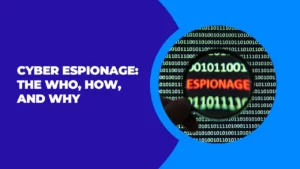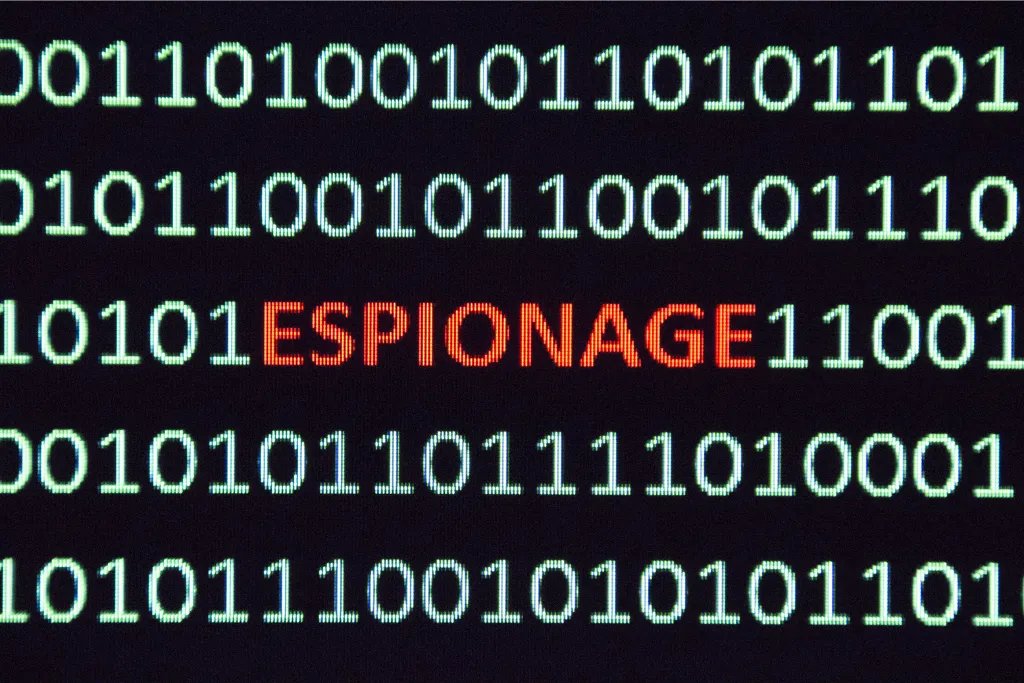Physical Address
304 North Cardinal St.
Dorchester Center, MA 02124
Physical Address
304 North Cardinal St.
Dorchester Center, MA 02124

As technology continues to advance, so does the risk of cyber espionage. In 2024, we can expect that cyber espionage will be at an all-time high, with more sophisticated tactics being used by hackers to gain access to sensitive data.
In this blog post, we will delve into the world of cyber espionage, exploring who the main players are and how they operate. We will also look at why cyber espionage is such a concern and examine notable cases in history that have shaken the world.
Finally, we will provide you with preventive measures that you can take to protect yourself against cyber espionage. Read on to learn about the global impact and repercussions of cyber espionage and whether your data is safe in 2024.

Understanding the landscape of cyber espionage in 2024 is crucial for individuals and organizations alike. This form of unauthorized access and data theft has become a significant threat to both national security and private entities.
Governments and hackers employ cyber espionage as a means of gathering intelligence and gaining economic advantage. To achieve their objectives, cyber spies rely on sophisticated tactics such as social engineering and malware. The impact of cyber espionage attacks can be long-lasting, leaving victims vulnerable and exposed for extended periods of time.
To combat this threat, it is essential to understand the types of cyber attacks employed by threat actors. By staying informed about the latest developments and taking necessary precautions, individuals and organizations can better protect themselves from the dangers of cyber espionage.
Nation-states such as China, Russia, and Iran actively participate in cyber espionage, leveraging the power of the internet to breach networks and systems. Intelligence agencies conduct cyber espionage operations with the objective of gathering sensitive information for national security purposes.
In addition to nation-states and intelligence agencies, cybercriminal groups are also key players in cyber espionage, driven by financial gain. Hacktivist groups join the ranks, utilizing cyberspace to promote their causes and ideologies. Furthermore, government organizations and military entities play a significant role in carrying out cyber espionage activities.
These main players in cyber espionage employ various tactics, including social engineering, malware, and exploiting vulnerabilities, to infiltrate their targets’ networks and stay undetected for long periods of time. It is crucial to understand the motivations and actions of these actors to effectively combat cyber espionage and protect against potential data breaches.
Cyber espionage works by exploiting vulnerabilities in computer systems. Attackers gain unauthorized access using tactics like phishing and social engineering. They use malware to infiltrate target systems and exfiltrate data. Perpetrators also employ sophisticated techniques to evade detection and maintain access.
Phishing emails play a significant role in cyber espionage by enticing victims into disclosing sensitive information. Social engineering techniques are another common tactic for manipulating individuals to gain access to secure systems. Advanced persistent threats (APTs) are utilized by threat actors to maintain long-term access, ensuring that they can continue their cyber spying undetected.
Supply chain attacks exploit vulnerabilities in trusted software or hardware, enabling attackers to infiltrate target networks indirectly. Malware, such as keyloggers and remote access trojans, is deployed to steal valuable data. These tactics collectively form the arsenal of cyber spies, who employ technical know-how and sophisticated strategies to breach their targets’ defenses.
By exploiting weaknesses in the digital realm, cyber espionage continues to be a significant concern in our increasingly interconnected world.
Government agencies, military organizations, private companies with valuable intellectual property, financial institutions, and critical infrastructure are primary targets of cyber espionage. Human rights activists and journalists may also be targeted for their sensitive information.

The continuous concern surrounding cyber espionage arises from its ability to provide attackers with a competitive advantage in various sectors. The theft of trade secrets and intellectual property can lead to severe economic consequences.
Additionally, cyber espionage can undermine national security, compromise government entities, disrupt research and innovation in academic institutions, and pose a significant threat due to the increasing sophistication of attacks.
Read More: Inside Cyber Terrorism: Motivations, Methods, and How to Protect Yourself
Attackers gain access to cyber espionage by exploiting vulnerabilities in software and hardware. They use social engineering techniques to manipulate individuals and gain unauthorized access.
Supply chain attacks compromise trusted software or hardware while spear-phishing emails trick people into revealing sensitive information. Zero-day exploits target unknown vulnerabilities for initial access.
In recent years, several cyber espionage cases have made headlines and shaken the world with their impact. One such case involved the Stuxnet worm, which was attributed to the U.S. and Israel. This sophisticated malware specifically targeted Iran’s nuclear facilities, causing significant damage.
Another notable case is Operation Aurora, attributed to China, which targeted several major technology companies and resulted in the theft of valuable intellectual property. The Russian-backed hacking group Fancy Bear has also carried out cyber espionage against various targets, including government entities and political organizations.
In a high-profile incident, the Sony Pictures hack, attributed to North Korea, exposed sensitive data and disrupted operations. Additionally, the Vault 7 leak revealed the CIA’s cyber espionage capabilities, raising concerns about the extent of surveillance and cyber warfare activities.
These cases serve as reminders of the persistent threat of cyber espionage and the need for robust security measures to protect against such attacks.
Throughout history, there have been several notable cyber espionage incidents that have made a significant impact on various nations and organizations. The Moonlight Maze cyber espionage campaign targeted U.S. military and government networks, infiltrating sensitive information and causing alarm.
The Titan Rain attacks, attributed to China, focused on U.S. government entities, highlighting the potential threat posed by nation-state actors. Operation Shady RAT, also attributed to China, successfully infiltrated numerous global organizations, exposing vulnerabilities in their cybersecurity defenses.
GhostNet, another cyber espionage operation attributed to China, hacked into governments and organizations worldwide, demonstrating the global reach and impact of cyber spying.
Lastly, the Equation Group, an entity attributed to the U.S., conducted sophisticated cyber espionage operations, revealing the technical expertise and capabilities of certain actors in this domain.
These incidents serve as a reminder of the constant presence and evolving nature of cyber threats, as well as the need for effective cybersecurity measures to counter such attacks.

Implementing robust access controls and authentication mechanisms is crucial to thwart unauthorized access attempts. Regularly updating software and systems helps patch vulnerabilities, fortifying defenses against cyber espionage attacks. Educating employees about social engineering tactics empowers them to identify and avoid potential threats.
Deploying advanced threat detection tools enables timely detection and response to cyber espionage attempts. Regular security assessments and audits play a vital role in identifying and mitigating potential vulnerabilities before they are exploited.
By implementing these preventive measures, organizations can significantly enhance their protection against cyber espionage incidents.
To prevent cyber espionage, it is essential to regularly update software and systems, safeguarding against vulnerabilities. Strong access controls and authentication measures should be implemented to prevent unauthorized access.
Educating employees about cybersecurity best practices is crucial in minimizing the risk of social engineering attacks. Encryption should be utilized to protect sensitive data from interception or unauthorized access. Regular security audits and assessments are necessary to identify and address potential weaknesses in systems.
By following these best practices, organizations can enhance their defense against cyber spying and protect themselves from the activities of threat actors. Implementing these preventive measures will help ensure the safety of data and sensitive information, mitigating the risks associated with cyber espionage.
Cyber espionage poses a significant threat to national security and can destabilize international relations. The theft of intellectual property through cyber espionage can cause severe economic damage to businesses and industries. Governments engage in cyber espionage to gain a competitive advantage, gather intelligence, or disrupt their adversaries.
Cyber espionage attacks can target government organizations, academic institutions, and private companies across industries. The increasing sophistication of cyber espionage attacks requires constant vigilance and collaboration between nations. These attacks can have far-reaching consequences on both a national and global scale.
The internet and social media platforms have become battlegrounds for state-sponsored cyber warfare, with threat actors from countries like the United States, China, and North Korea constantly engaging in cyber spying activities. Breaches of sensitive information can lead to political tensions and strained diplomatic relations between nations.
As cyber spies become more technologically advanced, the need for strong cybersecurity measures becomes even more crucial. Governments, businesses, and individuals must stay updated on the latest cyber threats and take necessary precautions to protect themselves from these bad actors.
The impact of cyber espionage on international relations is significant. It can strain diplomatic relationships, lead to escalations and conflicts, and result in diplomatic pressure and economic sanctions. Additionally, it undermines international cooperation on cybersecurity and complicates the attribution of attacks.
With evolving cyber espionage threats, ensuring the safety of your data in 2024 is crucial. Invest in robust threat detection and response capabilities, collaborate with cybersecurity experts, and implement comprehensive frameworks to protect against emerging risks. Ongoing monitoring and assessment are essential for safeguarding your data.
As we move deeper into the digital age, the threat of cyber espionage continues to loom over individuals, organizations, and nations. It is crucial to understand the tactics used by attackers and the vulnerabilities they exploit to gain access to sensitive information.
By implementing best practices and preventive measures, we can strengthen our defenses against cyber espionage. However, it’s important to note that cyber espionage not only has a direct impact on security but also affects international relations.
As we navigate the complexities of a technologically interconnected world, protecting our data becomes more important than ever. Stay vigilant, stay informed, and take the necessary steps to ensure that your data remains safe from cyber espionage in 2024.